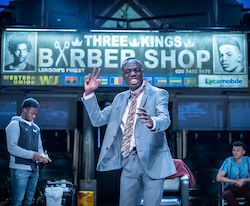The London and African barber shops frequented by the self-proclaimed strong black men in Inua Ellams’ hit play Barber Shop Chronicles, currently touring the UK in a joint production between Fuel, National Theatre and Leeds Playhouse, serve a similar social function to the dying and often derided working men’s pubs of Scotland.
They are both, as Ellams rightly notes in the programme, “sacred spaces” where men gather to chew the cud about the past and the present, and toast what they hope will be a brighter and better tomorrow. Or at the very least, not a worse one. Much like the burgeoning men’s shed movement which provides opportunities for mostly retired men to connect, converse and create.

Questions are asked by both barmen and barbers to stimulate conversation. And the quality of the answers and the nature of the subsequent interactions depend on how much the customers trust the person who is going to render them half-cut and how much they are prepared and/or able to drop their guard.
And the most powerful and poignant question of all, posed by Ellams through the mouthpiece of the youngest character, a jobbing actor who is struggling with the concept of what it means to be a “strong black man”, is on the surface the simplest: “How was your day?”
If you’ve had a shit day, do you confide? Or do you bury the truth in silence or a monosyllabic reply? Or do you deflect it by talking about football? A recurring tactic used by the terrific twelve-strong cast to highlight the tribal conflicts between old and young, fathers and sons, the powerful and the powerless.
There are serious undertones to the numerous “chronicles” which echo and overlap one another during the 105-minute riot of colour and noise, directed with pace, energy and subtlety by Bijan Sheibani. All of which share universal themes and characteristics, as symbolised by Rae Smith’s superb design of an illuminated spinning globe around which sagging telegraph wires hang from towering poles like the rafters of a tent (another “sacred place” and shelter from the storm).
But they are delivered with such “vibrancy and tempo” (one character’s proud description of his native tongue) and loaded with such pearls of comic wisdom (“The older a man gets, the faster he can run as a boy”) that the effect on the audience is both joyous and life-affirming.
“How do we move forward?” asks the young actor towards the end of the play. “What do we do next?” The answer, as espoused by several characters, continents apart, being: “You’ve just got to put your own package together.” Whether that be in business, politics or the cutting room floor of life.
- REVIEW: Orphans @ Edinburgh King’s Theatre ⭐⭐⭐⭐ - 13th April 2022
- REVIEW: Everybody’s Talking About Jamie @ Edinburgh Festival Theatre ⭐⭐⭐⭐ - 30th March 2022
- REVIEW: Sheila’s Island @ Edinburgh King’s Theatre - 2nd March 2022
